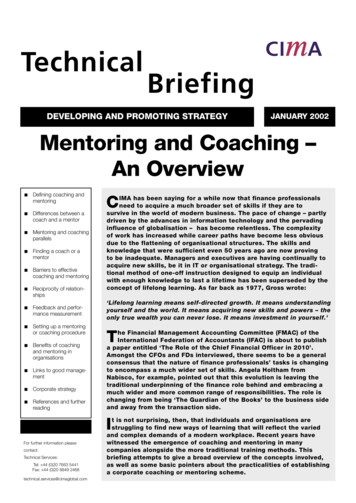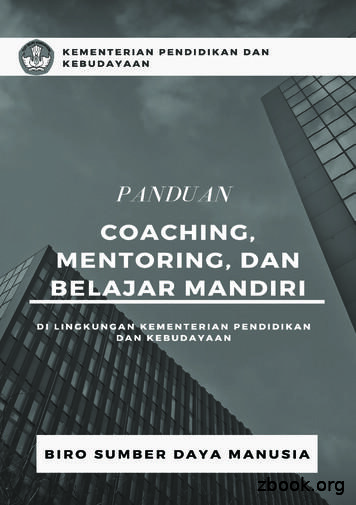Training Plan Coaching And Mentoring Training
Training PlanCoaching and Mentoring Training
Training PlanCoaching and Mentoring TrainingA Training Plan for Your OrganisationWhat is the purpose of the training?The purpose of the training is to initiate a process of rapid improvement, by means ofachieving a shared understanding of the correct knowledge and skills that we need to employ,if we are to achieve our stated goals.Coaching and Mentoring Course SummaryEveryone benefits from the effects of excellent coaching and mentoring. A good coach andmentor helps people find the right answers sooner, and without them going through the painof trial and error learning.This one-day Coaching and Mentoring course will help you develop specific skills, such assuggestive questioning, constructive feedback, confidence building, motivation,communication and reasoning skills. In addition, you will learn to mentor people by being anexemplar of the characteristics you wish to see in others.This course is ideal for anyone who wants to learn how to help others reach their fullpotential.Learning Outcomes for the Coaching and Mentoring Course Become a better coach and mentor and help others to achieve their goalsUse questions to guide people, rather than instructions to tell themHelp others to set and achieve worthwhile goalsEncourage others to build plans that will achieve their goalsDevelop more confidence in yourself and othersGive constructive feedback in a way that inspires positive changeBecome a role model: Mentors often teach by role modellingCustomer Review“Following this course, I feel now I can prioritise and plan my work in a more specific,measurable way, whilst obtaining clear objectives by revisiting the plan. The trainer’spresentation was clear, correct pace, precise.Helen ScottCambrian Park and Leisure Homes LtdPage 2
Training PlanCoaching and Mentoring TrainingCoaching and Mentoring Training Course OverviewThis course is split into four sections:Definitions of coaching and mentoring.We begin by defining exact meanings of the terms “coaching” and “mentoring”. What do theyhave in common? How do they differ? What skills do they require from us? We will give youour definitions, and we will ask you for yours. We will create a template for each skill set,coaching and mentoring. Then we will use the templates to assess your current strengths andweaknesses.Self-analysis / personal learning outcomes.We analyse your current strengths and relative weaknesses against the list of coaching andmentoring skills.The aim is twofold, to play to your strengths and to eliminate weaknesses. Eliminatingweaknesses is the most important, because it only takes one obvious error or omission to ruinyour performance as coach or mentor.We will ask you to write down your personal learning outcomes, for the course.How to develop specific coaching skills.We explore coaching skills in more detail:Main topics: Clear communication. Reasoning skills. Emotional intelligence.Subset skills: Suggestive questioning, constructive feedback, performance management,confidence building.How to develop mentoring skills.Now we turn our focus onto the more profound form of teaching, mentoring. You have heardit said, “Actions speak louder than words”. It is true.If you tell your trainees to do X, but they see you not doing X, then all your earlier training iswasted. It is not enough to talk the talk, we must also walk the walk.Mentoring and role modelling are more profound because they contain strong moral, ethicaland character-based components. We must consistently be what we want to see. We willinvestigate the moral, ethical and character-based qualities we need to be effective mentors.Page 3
Training PlanCoaching and Mentoring TrainingCoaching and Mentoring Training Course DetailsMorning SessionDefinitions and examples of coaching and mentoringThe first step to wisdom is to gain a clear understanding of what we are talking about: to giveclear and distinct definitions of the terms we are using.We offer the definition of coaching as “a form of teaching/training, based upon givingindividualised instruction designed to improve the learner’s skills, knowledge, technique andconfidence”.On the other hand, mentoring is “a (different) form of training based upon demonstrating andexemplifying the specific skills and attributes that the mentor wants to inspire in the learner".This is often called, role modelling.What are the skills, knowledge, attitudes shared by all good coaches and mentors?In order to act as an effective coach and mentor, we must possess a range of specialist skills,knowledge and attitudes. Which skills, knowledge and attitudes are required for each?We will formulate a theoretical-ideal, which we will use as a template against which to judgeour own performance as coach and mentor. Then we assess exactly where we currentlydeviate from the ideal, and where our actions more closely correspond to the ideal.Play to strengths: Work on weaknessesCoaching and mentoring have a twofold aim; to play to and extend the range of strengths,and to simultaneously identify and eliminate errors.Of the two aims, the elimination of error is by far the most important. Everyone is happy toshow off their strengths (which is great for the ego but does not produce much growth).A smaller number of people take time to identify their flaws and work diligently to eradicateerror. But remember it takes only one obvious flaw in a performance, to destroy all chancesof success.So, we start by identifying our strengths and more importantly we identify where we are notas strong but need to be. This becomes the major focus of training; to assess the currentcondition, play to strengths and work like crazy to bring up the weak points.Page 4
Training PlanCoaching and Mentoring TrainingThe first step to achievement is goal settingNobody can achieve a goal they never set. Therefore, the first step to achievement is to set agoal. We need to learn about goal setting.We will cover the whats, whys and hows of setting goals.We will present an eight-part system of goal setting, which will allow us to define targets; andbegin to assemble the mental, emotional, tangible and intangible resources needed toachieve goals.Specific coaching skillsNow we focus our attention on the specific skills associated to coaching, as distinct frommentoring. There are seven skills we will draw your attention to: clear communication,reasoning skills, emotional intelligence, suggestive questioning, constructive feedback,performance management, confidence building.Clear communicationOne of the biggest obstacles to effective coaching is the inherent ambiguity of language.People often use ambiguous language; words and phrases that have multiple possiblemeanings. This leads to misunderstandings, and misunderstandings cause problems.The solution is to use words and phrases that have only one possible meaning. Good coachingrelies on clear communication. We will show you three ways to help you to express your exactmeaning.Good reasonsEverything a coach does, should be for a good reason. Nothing should be arbitrary. Nothing israndom. We do not guess. As a coach you should not only explain what to do, but you shouldalso explain the reasons for it.If the learner knows what to do, but not why, then their motivation and understanding isundermined, and thus weakened. We will explain how to best describe your reasoning.Page 5
Training PlanCoaching and Mentoring TrainingEmotional intelligenceEveryone is affected by emotions. So, all good coaches know how to use emotions to theirbest advantage. Every emotion has its uses and they are subtle.For instance, not all negative emotions are bad, since for some people, anger can be apowerful motivator to improve. And not all positive emotions are good, overconfidence canbe the cause of failure.So, a good coach understands how to use the right emotion, at the right time, in order to getthe performance needed from their trainees.We will teach you the almost magical art of emotional management.Suggestive questioningMost people don’t like to be told! So, it is often better to frame your guidance in the form ofsuggestive questions.Salespeople have a phrase: “If I tell them, they fight me. But if I ask them the right questions,their answers convince them”.Therefore, what does a good coach try to do? A good coach uses questions to guide thelearner in the right direction by means of suggestion.Customer Review“The training course was very useful and packed full of information. The language usedwas very user-friendly and understandable. The Trainer’s presentation was really good,the trainer showed lots of confidence and had great knowledge.Jackson SutditteCrown Gas and PowerPage 6
Training PlanCoaching and Mentoring TrainingAfternoon SessionConstructive feedback, performance managementPerformance management and constructive feedback go together, like twins. To improve apersons performance means you need to give them constructive, (not destructive) feedback.We will examine the difference between constructive, helpful feedback and destructive. Wenever use words in destructive ways. We use words only in constructive ways. You will findthis skill is a game changer.Building the self-conceptThe self-concept is “the beliefs people hold about themselves, in terms of their native abilityand potential”.If the person thinks badly of themselves (they have a weak self-concept), then that alone, isenough to destroy their chances of high achievement.If a person thinks well of themselves (strong self-concept), then that opens the door to thepossibility of future growth.All good coaches know about the role of the self-concept and its effects on self-confidenceand performance. This session will teach you everything you need to know.How to develop your mentoring skillsNow we turn our focus onto the more profound form of teaching: Mentoring.You have heard it said, “Talk’s cheap” and “Actions speak louder than words”. It is true.If Mr Mentor tells others to “Do X”, but then they later see him do the exact opposite, then allMr Mentor's earlier words and future pronouncements are rendered worthless.Good mentors exemplify their highest ideals.Mentors’ motto: BE what you want to SEE.Page 7
Training PlanCoaching and Mentoring TrainingSocial learning theorySocial learning theory says that people learn how to behave by watching and mimickingothers. Babies do it, kids do it and grownups do it too.If we are to be successful mentors then we must not only "talk the talk", we must also "walkthe walk", because our actions speak louder than our words.Integrity is powerIntegrity means that a person’s words and actions are fully integrated, which means they dowhat they say they will do. That is, they don’t say one thing and then do the opposite.If they say they believe in justice, their actions demonstrate that.If they say they believe in reason, their actions demonstrate that.A good mentor will always have integrity. If you want to be a good mentor, then act inaccordance with your best words.Mentoring has moral and ethical componentsIntegrity is a moral / ethical principle which is applicable to mentoring.But there are many more ethical / moral principles, mentors should embody.Here are a few of the most important ethical, moral principles applicable to good mentors:1.2.3.4.5.HonestyJusticeIndustry (hard work)KindnessRespectAny breach of these ethical principles will cause failure:1.2.3.4.5.DishonestyInjusticeLaziness, laxityUnkindnessDisrespect. RudenessMentors do well by doing good.Page 8
Training PlanCoaching and Mentoring TrainingMentors lead by exampleLet us finish our course by looking at some real-life examples of what we would consider to beexcellent coaches/mentors.You can pick a coach from any field of human endeavour: sport, business, the arts, militaryhistory, social politics, economics, philosophy or your own personal story.We will ask you to tell us who we could use, to exemplify the concept of excellent coach andmentor.Customer Review“The course contained a lot of content with good formulas/diagrams to make it easy toremember. Plenty of examples to help identify with each element. Use of practice andwriting notes helped focus the mind and memorise elements. The trainer’s presentationwas very interactive and thought-provoking. Good sense of humour to keep alldelegates interested. Held delegates attention by asking for delegates own comments.Summarised frequently.Jeannette McDonnellInternational Greetings UK LtdPage 9
Training PlanCoaching and Mentoring TrainingTraining Costs / InvestmentBespoke In-House or Live-Online Course 1,950 VAT per training dayPlus, hotel accommodation for trainer if needed (Premier Inn type: not the Hilton!)(International Price Varies)In-House training has been designed to provide a similar experience to our open courses,however we can tailor the content to fit your specific needs.We are able to train in your timezone.All our training includes: A full day of quality training, delivered by an experienced trainerTotal of 6 CPD training hours (usually 9am - 4.30pm), plus an additional 2-3 via postcourse online independent learningFull digital interactive course notesTraining certificateAccess to additional free training material after the course via our post-course portal3 months free telephone coaching: Whilst you are implementing what you havelearned, if you need to, you can contact us for support and guidanceWe suggest the following plan of action:Please send to us:1. Any amendments or changes you wish to make to the programme.2. Your thoughts.3. The next step you would like us to take.Thank you.Corporate Coach Training LtdWalcot HouseParton RoadChurchdownGloucestershireGL3 2JJEmail: lindsey@corporatecoachgroup.comTel: 44 (0) 1452 856091Page 10
Training PlanCoaching and Mentoring TrainingCustomer Reviews“The course content was excellent, in particular the conflict management, timemanagement and mindfulness sections. The techniques taught in the course willbe of generic great value both in work and personal life. Chris is an excellentpresenter, putting a group originally very socially awkward and nervous at ease.Very friendly and puts a positive spin on answers even to difficult questions.Mark HorneRDB Concepts“The course was very educational. Lots of information with clear objectives. Iliked the course handbook as I can digest at home. The trainer presented verywell, with good humour. Very clear views on positive attitude and timemanagement.Alistair MannPanztel“Very useful information provided on course. I hope to apply the concepts to myleadership. Was also very thought-provoking. The trainer was extremelyenthusiastic, with a strong belief in the content. Well explained, effectiveexamples.Martyn WathinsThe Henley College“The course was professionally presented and well paced, with materials thatmade the learning easier. The trainer’s presentation was excellent! The trainerwas professional and knowledgeable about the subject material. Responsive toquestions and scenarios and also helpful.Robert SimpsonEducation Funding AgencyPage 11
Coaching and Mentoring Training Page 4 Coaching and Mentoring Training Course Details . Morning Session Definitions and examples of coaching and mentoring The first step to wisdom is to gain a clear unders
violence. It forms part of the Transnational Guide for Life Coaching and Mentoring that can be transferred to other organisations. Two innovative methodologies are used in this project, namely, life coaching and mentoring. The life coaching tools improve women’s self-esteem and self-confidence and the mentoring tools on entrepreneurship and
1.3 Mentoring and coaching for school leaders: the UK policy context.6 1.4 Why mentoring and coaching?. 7 2. Types of Mentoring and Coaching
managers by the CIPD in 1999, some 87 per cent of UK companies have some kind of a coaching or mentoring scheme. There is certainly no shortage of books, papers and conferences on the subject. There are many kinds of coaching and mentoring – from life coaching to mentoring schemes designed exclusively for women or minorities to corporate peer .
B. TUJUAN PANDUAN COACHING, MENTORING, DAN BELAJAR MANDIRI Panduan ini disusun untuk: 1. Memudahkan atasan langsung dalam memahami dan membedakan pengertian antara Coaching, Mentoring, dan Belajar Mandiri 2. Menjelaskan atasan langsung tentang tugas dan peran yang dilakukannya selama berlangsungnya proses Coaching, Mentoring, dan Belajar Mandiri 3.
training and can present risks to their coaching business. There are specific coaching niches such as substance abuse recovery coaching or ADHD coaching where the coach has specialized training to address the client's distress and in those circumstances, it may be appropriate for them to begin coaching at this level. 2. Resilience Coaching
Keywords: Coaching, Mentoring, Clients, Theories, Potential. Introduction The aim of this paper is to explore into, and understand, theories and models within the coaching process. The researcher reviewed theories and models related to coaching and mentoring in order to lay a more or less solid foundati
Johari’s window, NLP, and other psycho-social models) Recording and monitoring coaching or mentoring activities Strategies for coaching or mentoring Planning principles and practices for coaching or mentoring sessions Methodologies and criteria for a
accounting equation as shown above. The accounting equation is a simple expression of the fact that at any point in time the assets of the entity will be equal to its liabilities plus its equity. The transactions of a new business entity in its first five days are as follows: Required:























